Human Resource Sustainability Initiatives at Foxconn
VerifiedAdded on 2022/11/13
|9
|2175
|145
AI Summary
This report discusses the human resource sustainability initiatives implemented by Foxconn, their authenticity, and contribution to positive human and social outcomes. The report analyzes the different initiatives and their impact on the employees and society. It also highlights the differences in the same initiatives in different business contexts. The report is relevant to the subject of human resource management and can be used by students pursuing courses in this field.
Contribute Materials
Your contribution can guide someone’s learning journey. Share your
documents today.
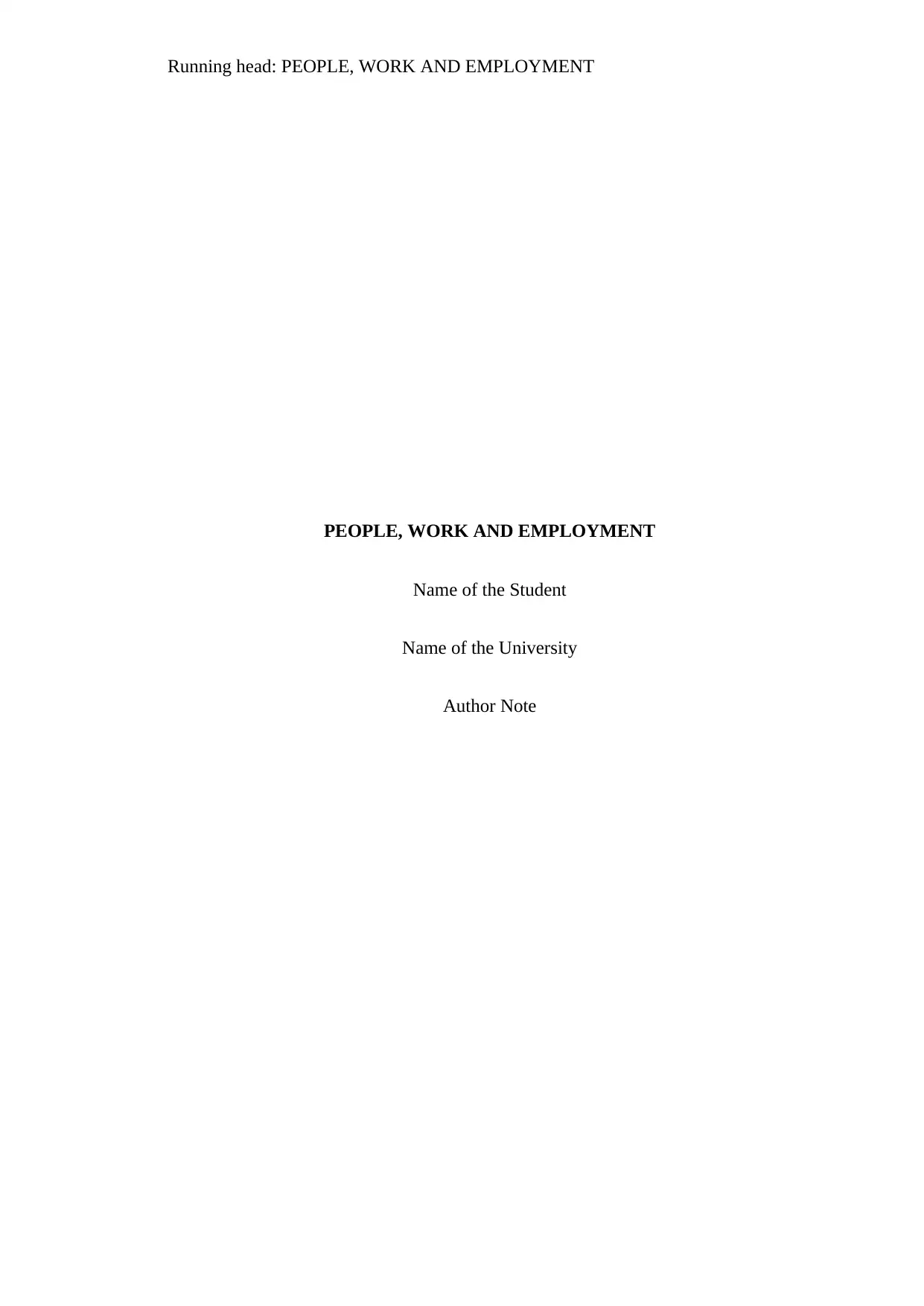
Running head: PEOPLE, WORK AND EMPLOYMENT
PEOPLE, WORK AND EMPLOYMENT
Name of the Student
Name of the University
Author Note
PEOPLE, WORK AND EMPLOYMENT
Name of the Student
Name of the University
Author Note
Secure Best Marks with AI Grader
Need help grading? Try our AI Grader for instant feedback on your assignments.
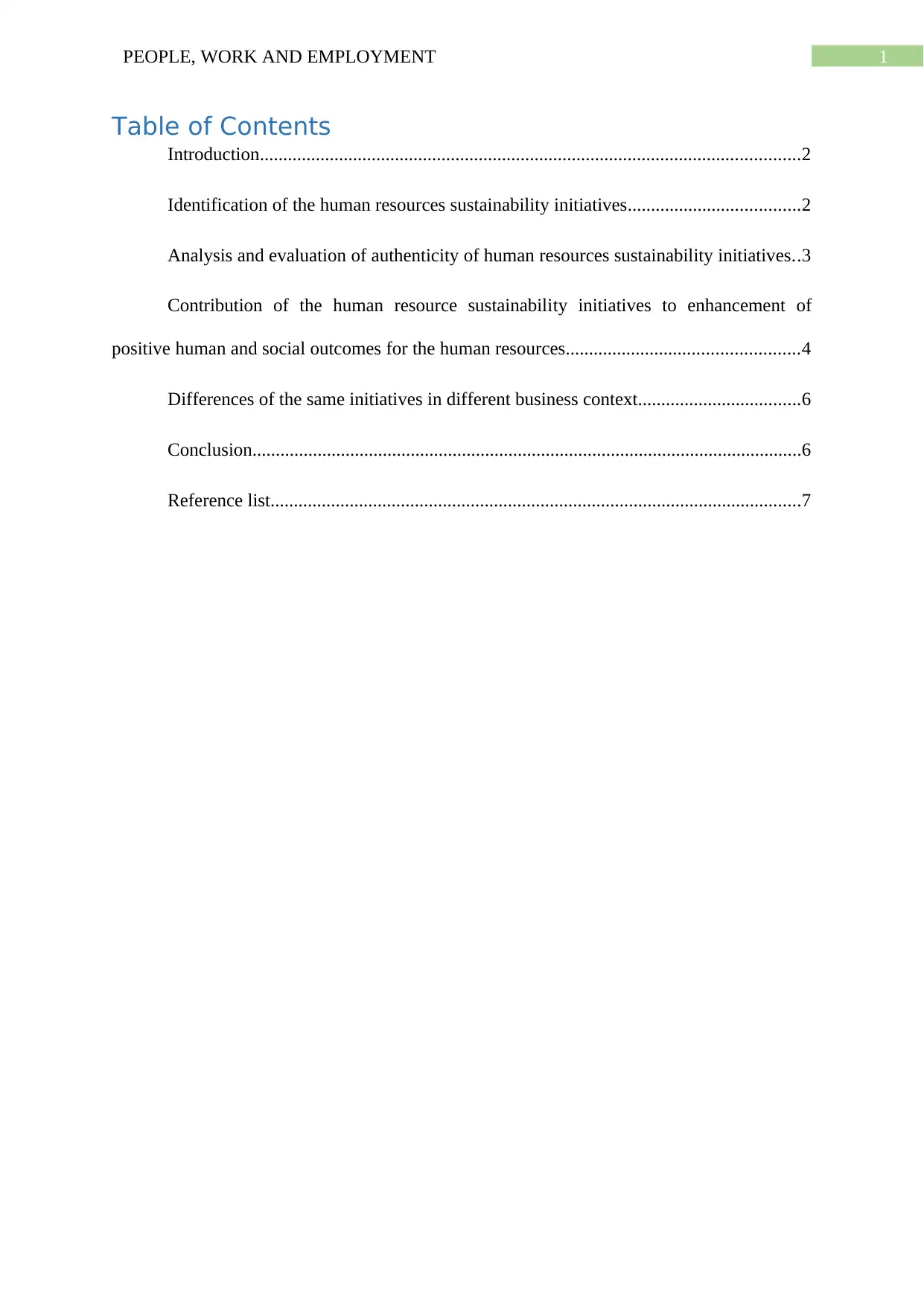
1PEOPLE, WORK AND EMPLOYMENT
Table of Contents
Introduction....................................................................................................................2
Identification of the human resources sustainability initiatives.....................................2
Analysis and evaluation of authenticity of human resources sustainability initiatives..3
Contribution of the human resource sustainability initiatives to enhancement of
positive human and social outcomes for the human resources..................................................4
Differences of the same initiatives in different business context...................................6
Conclusion......................................................................................................................6
Reference list..................................................................................................................7
Table of Contents
Introduction....................................................................................................................2
Identification of the human resources sustainability initiatives.....................................2
Analysis and evaluation of authenticity of human resources sustainability initiatives..3
Contribution of the human resource sustainability initiatives to enhancement of
positive human and social outcomes for the human resources..................................................4
Differences of the same initiatives in different business context...................................6
Conclusion......................................................................................................................6
Reference list..................................................................................................................7
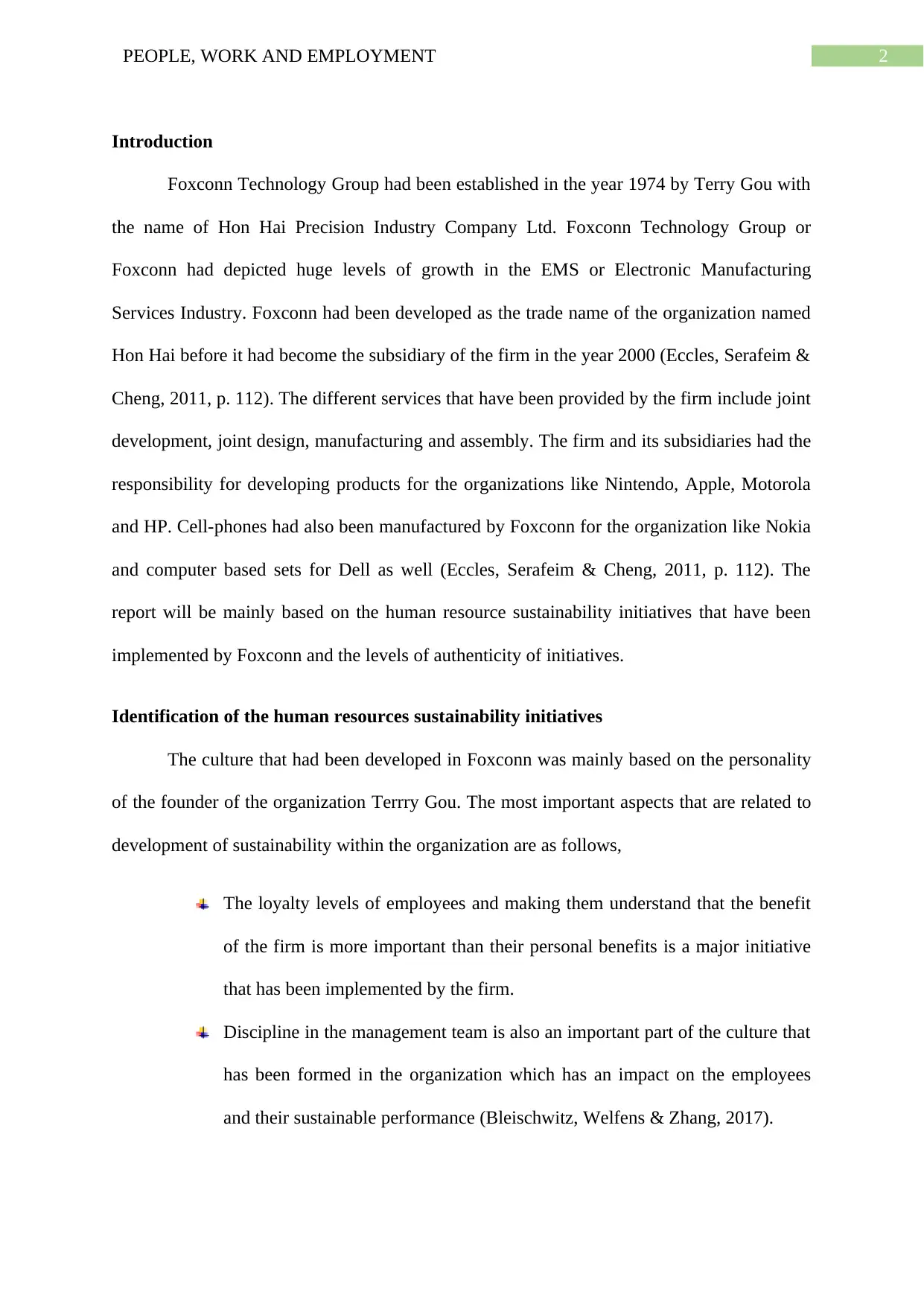
2PEOPLE, WORK AND EMPLOYMENT
Introduction
Foxconn Technology Group had been established in the year 1974 by Terry Gou with
the name of Hon Hai Precision Industry Company Ltd. Foxconn Technology Group or
Foxconn had depicted huge levels of growth in the EMS or Electronic Manufacturing
Services Industry. Foxconn had been developed as the trade name of the organization named
Hon Hai before it had become the subsidiary of the firm in the year 2000 (Eccles, Serafeim &
Cheng, 2011, p. 112). The different services that have been provided by the firm include joint
development, joint design, manufacturing and assembly. The firm and its subsidiaries had the
responsibility for developing products for the organizations like Nintendo, Apple, Motorola
and HP. Cell-phones had also been manufactured by Foxconn for the organization like Nokia
and computer based sets for Dell as well (Eccles, Serafeim & Cheng, 2011, p. 112). The
report will be mainly based on the human resource sustainability initiatives that have been
implemented by Foxconn and the levels of authenticity of initiatives.
Identification of the human resources sustainability initiatives
The culture that had been developed in Foxconn was mainly based on the personality
of the founder of the organization Terrry Gou. The most important aspects that are related to
development of sustainability within the organization are as follows,
The loyalty levels of employees and making them understand that the benefit
of the firm is more important than their personal benefits is a major initiative
that has been implemented by the firm.
Discipline in the management team is also an important part of the culture that
has been formed in the organization which has an impact on the employees
and their sustainable performance (Bleischwitz, Welfens & Zhang, 2017).
Introduction
Foxconn Technology Group had been established in the year 1974 by Terry Gou with
the name of Hon Hai Precision Industry Company Ltd. Foxconn Technology Group or
Foxconn had depicted huge levels of growth in the EMS or Electronic Manufacturing
Services Industry. Foxconn had been developed as the trade name of the organization named
Hon Hai before it had become the subsidiary of the firm in the year 2000 (Eccles, Serafeim &
Cheng, 2011, p. 112). The different services that have been provided by the firm include joint
development, joint design, manufacturing and assembly. The firm and its subsidiaries had the
responsibility for developing products for the organizations like Nintendo, Apple, Motorola
and HP. Cell-phones had also been manufactured by Foxconn for the organization like Nokia
and computer based sets for Dell as well (Eccles, Serafeim & Cheng, 2011, p. 112). The
report will be mainly based on the human resource sustainability initiatives that have been
implemented by Foxconn and the levels of authenticity of initiatives.
Identification of the human resources sustainability initiatives
The culture that had been developed in Foxconn was mainly based on the personality
of the founder of the organization Terrry Gou. The most important aspects that are related to
development of sustainability within the organization are as follows,
The loyalty levels of employees and making them understand that the benefit
of the firm is more important than their personal benefits is a major initiative
that has been implemented by the firm.
Discipline in the management team is also an important part of the culture that
has been formed in the organization which has an impact on the employees
and their sustainable performance (Bleischwitz, Welfens & Zhang, 2017).
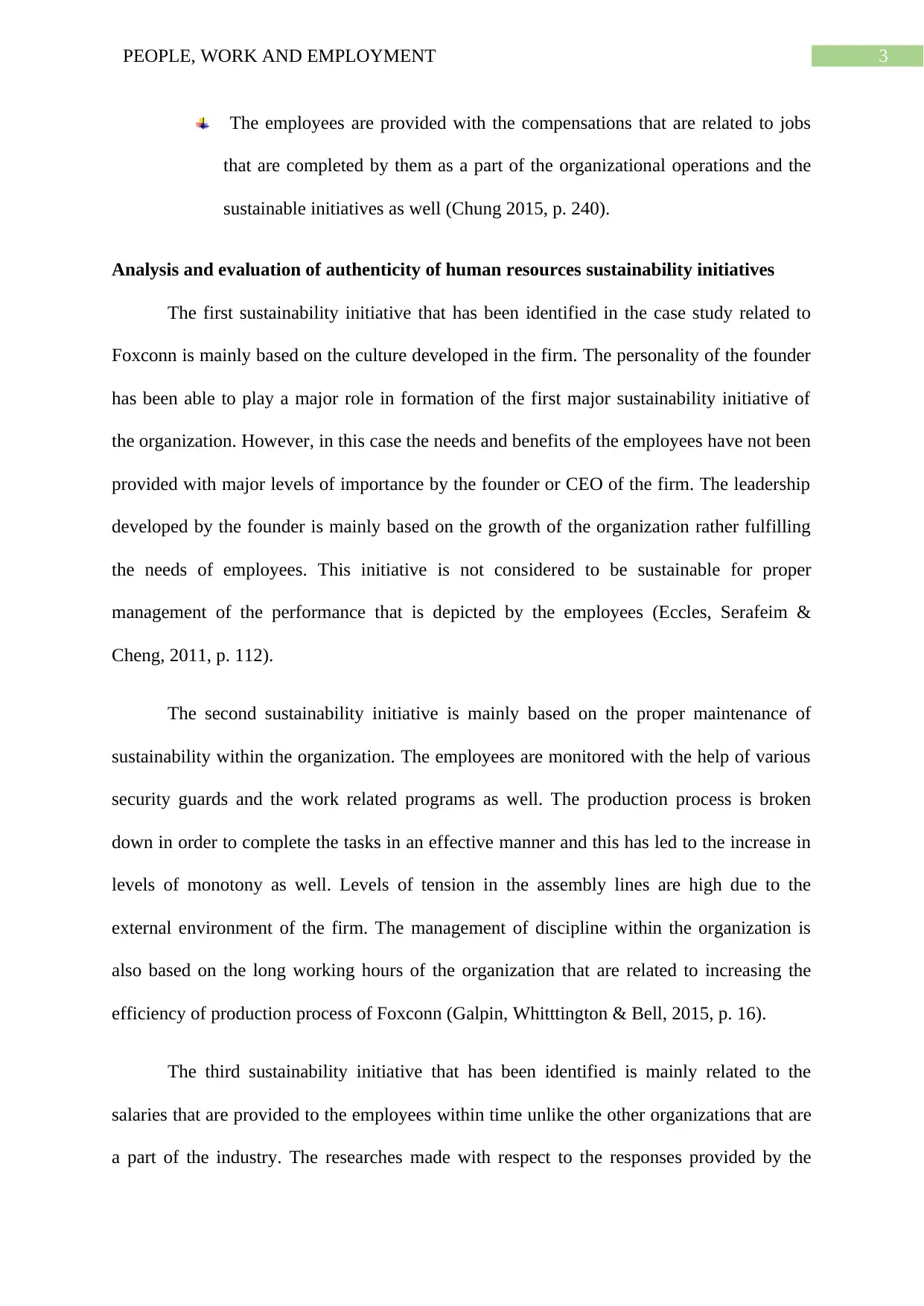
3PEOPLE, WORK AND EMPLOYMENT
The employees are provided with the compensations that are related to jobs
that are completed by them as a part of the organizational operations and the
sustainable initiatives as well (Chung 2015, p. 240).
Analysis and evaluation of authenticity of human resources sustainability initiatives
The first sustainability initiative that has been identified in the case study related to
Foxconn is mainly based on the culture developed in the firm. The personality of the founder
has been able to play a major role in formation of the first major sustainability initiative of
the organization. However, in this case the needs and benefits of the employees have not been
provided with major levels of importance by the founder or CEO of the firm. The leadership
developed by the founder is mainly based on the growth of the organization rather fulfilling
the needs of employees. This initiative is not considered to be sustainable for proper
management of the performance that is depicted by the employees (Eccles, Serafeim &
Cheng, 2011, p. 112).
The second sustainability initiative is mainly based on the proper maintenance of
sustainability within the organization. The employees are monitored with the help of various
security guards and the work related programs as well. The production process is broken
down in order to complete the tasks in an effective manner and this has led to the increase in
levels of monotony as well. Levels of tension in the assembly lines are high due to the
external environment of the firm. The management of discipline within the organization is
also based on the long working hours of the organization that are related to increasing the
efficiency of production process of Foxconn (Galpin, Whitttington & Bell, 2015, p. 16).
The third sustainability initiative that has been identified is mainly related to the
salaries that are provided to the employees within time unlike the other organizations that are
a part of the industry. The researches made with respect to the responses provided by the
The employees are provided with the compensations that are related to jobs
that are completed by them as a part of the organizational operations and the
sustainable initiatives as well (Chung 2015, p. 240).
Analysis and evaluation of authenticity of human resources sustainability initiatives
The first sustainability initiative that has been identified in the case study related to
Foxconn is mainly based on the culture developed in the firm. The personality of the founder
has been able to play a major role in formation of the first major sustainability initiative of
the organization. However, in this case the needs and benefits of the employees have not been
provided with major levels of importance by the founder or CEO of the firm. The leadership
developed by the founder is mainly based on the growth of the organization rather fulfilling
the needs of employees. This initiative is not considered to be sustainable for proper
management of the performance that is depicted by the employees (Eccles, Serafeim &
Cheng, 2011, p. 112).
The second sustainability initiative is mainly based on the proper maintenance of
sustainability within the organization. The employees are monitored with the help of various
security guards and the work related programs as well. The production process is broken
down in order to complete the tasks in an effective manner and this has led to the increase in
levels of monotony as well. Levels of tension in the assembly lines are high due to the
external environment of the firm. The management of discipline within the organization is
also based on the long working hours of the organization that are related to increasing the
efficiency of production process of Foxconn (Galpin, Whitttington & Bell, 2015, p. 16).
The third sustainability initiative that has been identified is mainly related to the
salaries that are provided to the employees within time unlike the other organizations that are
a part of the industry. The researches made with respect to the responses provided by the
Secure Best Marks with AI Grader
Need help grading? Try our AI Grader for instant feedback on your assignments.
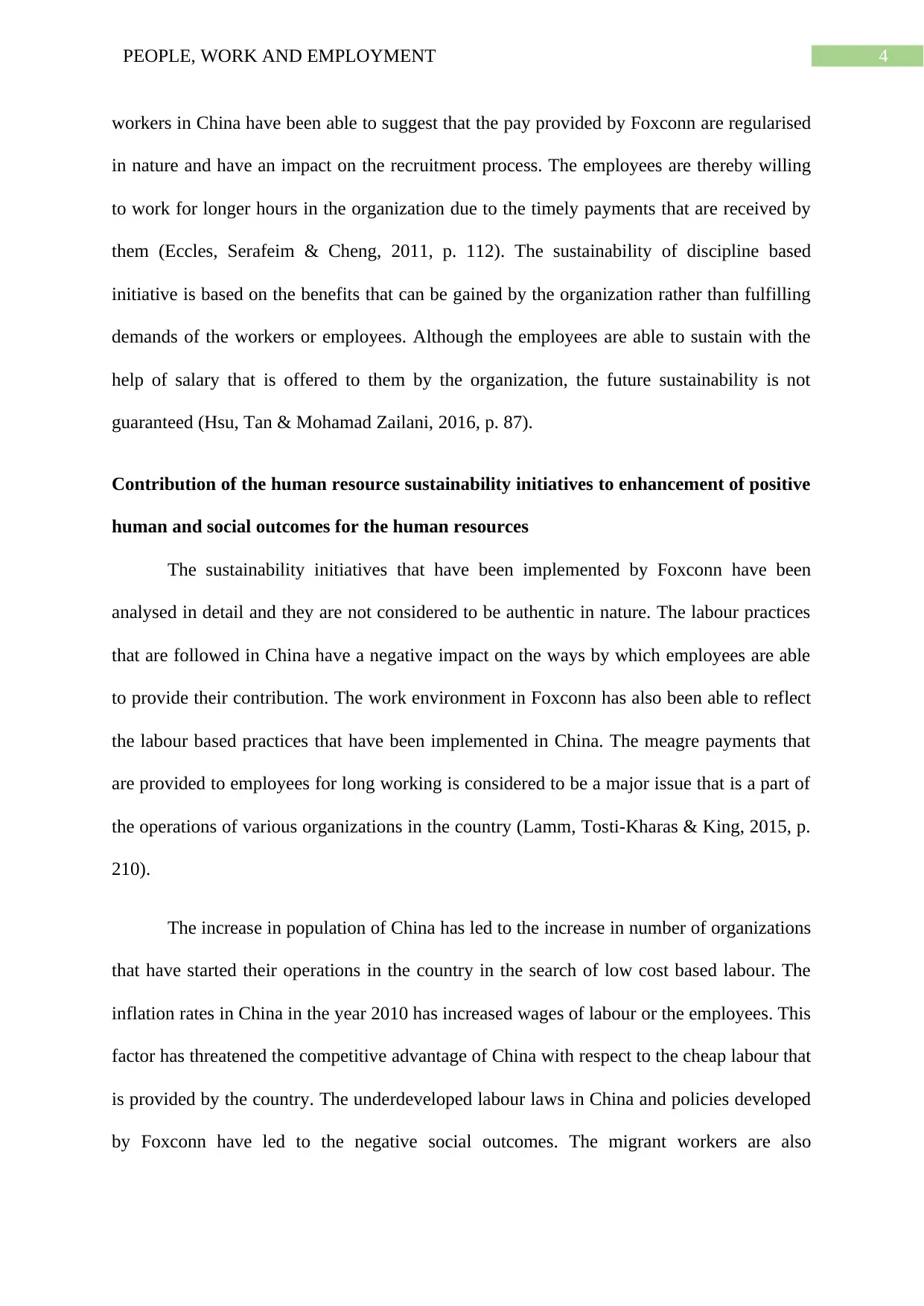
4PEOPLE, WORK AND EMPLOYMENT
workers in China have been able to suggest that the pay provided by Foxconn are regularised
in nature and have an impact on the recruitment process. The employees are thereby willing
to work for longer hours in the organization due to the timely payments that are received by
them (Eccles, Serafeim & Cheng, 2011, p. 112). The sustainability of discipline based
initiative is based on the benefits that can be gained by the organization rather than fulfilling
demands of the workers or employees. Although the employees are able to sustain with the
help of salary that is offered to them by the organization, the future sustainability is not
guaranteed (Hsu, Tan & Mohamad Zailani, 2016, p. 87).
Contribution of the human resource sustainability initiatives to enhancement of positive
human and social outcomes for the human resources
The sustainability initiatives that have been implemented by Foxconn have been
analysed in detail and they are not considered to be authentic in nature. The labour practices
that are followed in China have a negative impact on the ways by which employees are able
to provide their contribution. The work environment in Foxconn has also been able to reflect
the labour based practices that have been implemented in China. The meagre payments that
are provided to employees for long working is considered to be a major issue that is a part of
the operations of various organizations in the country (Lamm, Tosti-Kharas & King, 2015, p.
210).
The increase in population of China has led to the increase in number of organizations
that have started their operations in the country in the search of low cost based labour. The
inflation rates in China in the year 2010 has increased wages of labour or the employees. This
factor has threatened the competitive advantage of China with respect to the cheap labour that
is provided by the country. The underdeveloped labour laws in China and policies developed
by Foxconn have led to the negative social outcomes. The migrant workers are also
workers in China have been able to suggest that the pay provided by Foxconn are regularised
in nature and have an impact on the recruitment process. The employees are thereby willing
to work for longer hours in the organization due to the timely payments that are received by
them (Eccles, Serafeim & Cheng, 2011, p. 112). The sustainability of discipline based
initiative is based on the benefits that can be gained by the organization rather than fulfilling
demands of the workers or employees. Although the employees are able to sustain with the
help of salary that is offered to them by the organization, the future sustainability is not
guaranteed (Hsu, Tan & Mohamad Zailani, 2016, p. 87).
Contribution of the human resource sustainability initiatives to enhancement of positive
human and social outcomes for the human resources
The sustainability initiatives that have been implemented by Foxconn have been
analysed in detail and they are not considered to be authentic in nature. The labour practices
that are followed in China have a negative impact on the ways by which employees are able
to provide their contribution. The work environment in Foxconn has also been able to reflect
the labour based practices that have been implemented in China. The meagre payments that
are provided to employees for long working is considered to be a major issue that is a part of
the operations of various organizations in the country (Lamm, Tosti-Kharas & King, 2015, p.
210).
The increase in population of China has led to the increase in number of organizations
that have started their operations in the country in the search of low cost based labour. The
inflation rates in China in the year 2010 has increased wages of labour or the employees. This
factor has threatened the competitive advantage of China with respect to the cheap labour that
is provided by the country. The underdeveloped labour laws in China and policies developed
by Foxconn have led to the negative social outcomes. The migrant workers are also
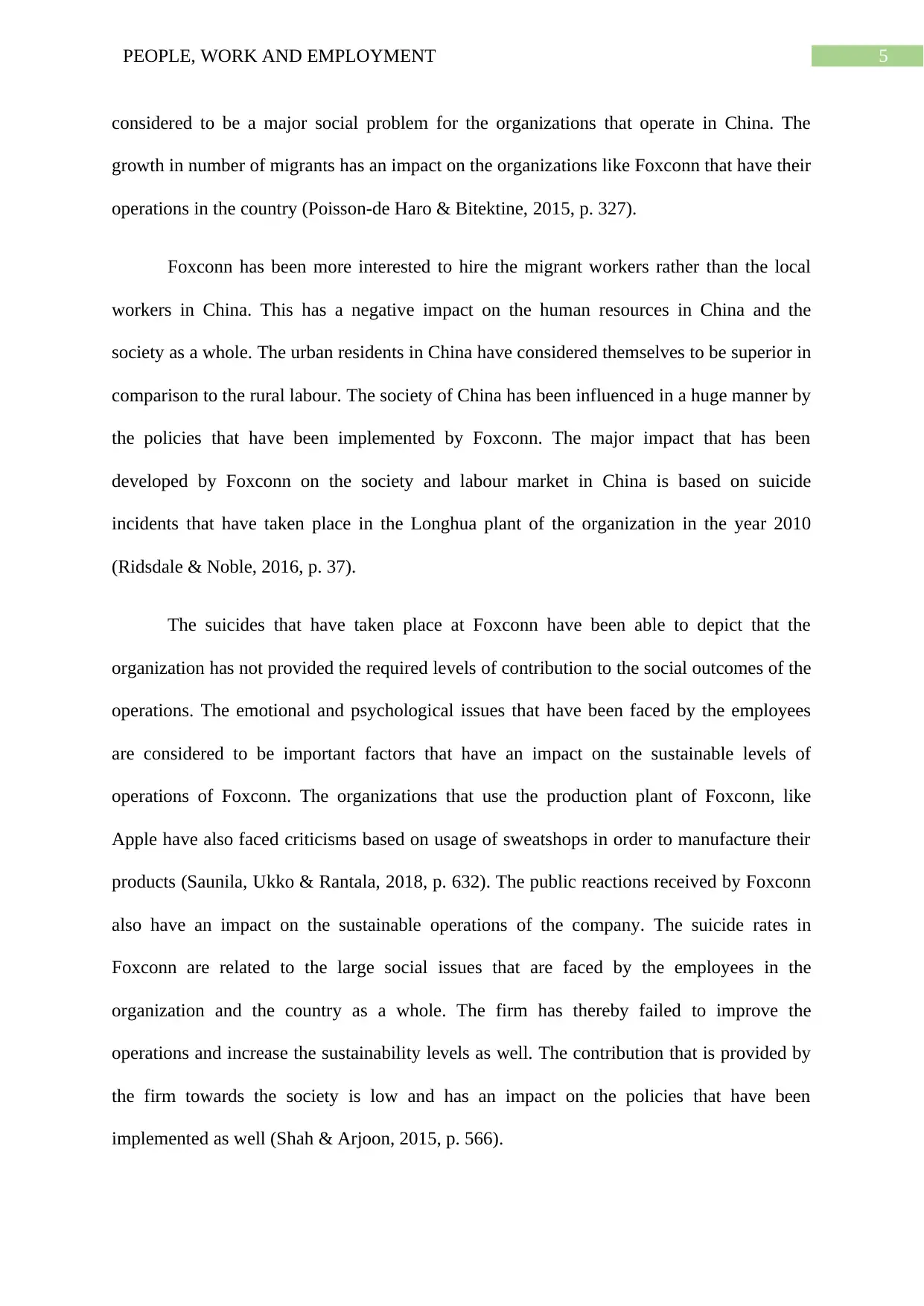
5PEOPLE, WORK AND EMPLOYMENT
considered to be a major social problem for the organizations that operate in China. The
growth in number of migrants has an impact on the organizations like Foxconn that have their
operations in the country (Poisson-de Haro & Bitektine, 2015, p. 327).
Foxconn has been more interested to hire the migrant workers rather than the local
workers in China. This has a negative impact on the human resources in China and the
society as a whole. The urban residents in China have considered themselves to be superior in
comparison to the rural labour. The society of China has been influenced in a huge manner by
the policies that have been implemented by Foxconn. The major impact that has been
developed by Foxconn on the society and labour market in China is based on suicide
incidents that have taken place in the Longhua plant of the organization in the year 2010
(Ridsdale & Noble, 2016, p. 37).
The suicides that have taken place at Foxconn have been able to depict that the
organization has not provided the required levels of contribution to the social outcomes of the
operations. The emotional and psychological issues that have been faced by the employees
are considered to be important factors that have an impact on the sustainable levels of
operations of Foxconn. The organizations that use the production plant of Foxconn, like
Apple have also faced criticisms based on usage of sweatshops in order to manufacture their
products (Saunila, Ukko & Rantala, 2018, p. 632). The public reactions received by Foxconn
also have an impact on the sustainable operations of the company. The suicide rates in
Foxconn are related to the large social issues that are faced by the employees in the
organization and the country as a whole. The firm has thereby failed to improve the
operations and increase the sustainability levels as well. The contribution that is provided by
the firm towards the society is low and has an impact on the policies that have been
implemented as well (Shah & Arjoon, 2015, p. 566).
considered to be a major social problem for the organizations that operate in China. The
growth in number of migrants has an impact on the organizations like Foxconn that have their
operations in the country (Poisson-de Haro & Bitektine, 2015, p. 327).
Foxconn has been more interested to hire the migrant workers rather than the local
workers in China. This has a negative impact on the human resources in China and the
society as a whole. The urban residents in China have considered themselves to be superior in
comparison to the rural labour. The society of China has been influenced in a huge manner by
the policies that have been implemented by Foxconn. The major impact that has been
developed by Foxconn on the society and labour market in China is based on suicide
incidents that have taken place in the Longhua plant of the organization in the year 2010
(Ridsdale & Noble, 2016, p. 37).
The suicides that have taken place at Foxconn have been able to depict that the
organization has not provided the required levels of contribution to the social outcomes of the
operations. The emotional and psychological issues that have been faced by the employees
are considered to be important factors that have an impact on the sustainable levels of
operations of Foxconn. The organizations that use the production plant of Foxconn, like
Apple have also faced criticisms based on usage of sweatshops in order to manufacture their
products (Saunila, Ukko & Rantala, 2018, p. 632). The public reactions received by Foxconn
also have an impact on the sustainable operations of the company. The suicide rates in
Foxconn are related to the large social issues that are faced by the employees in the
organization and the country as a whole. The firm has thereby failed to improve the
operations and increase the sustainability levels as well. The contribution that is provided by
the firm towards the society is low and has an impact on the policies that have been
implemented as well (Shah & Arjoon, 2015, p. 566).
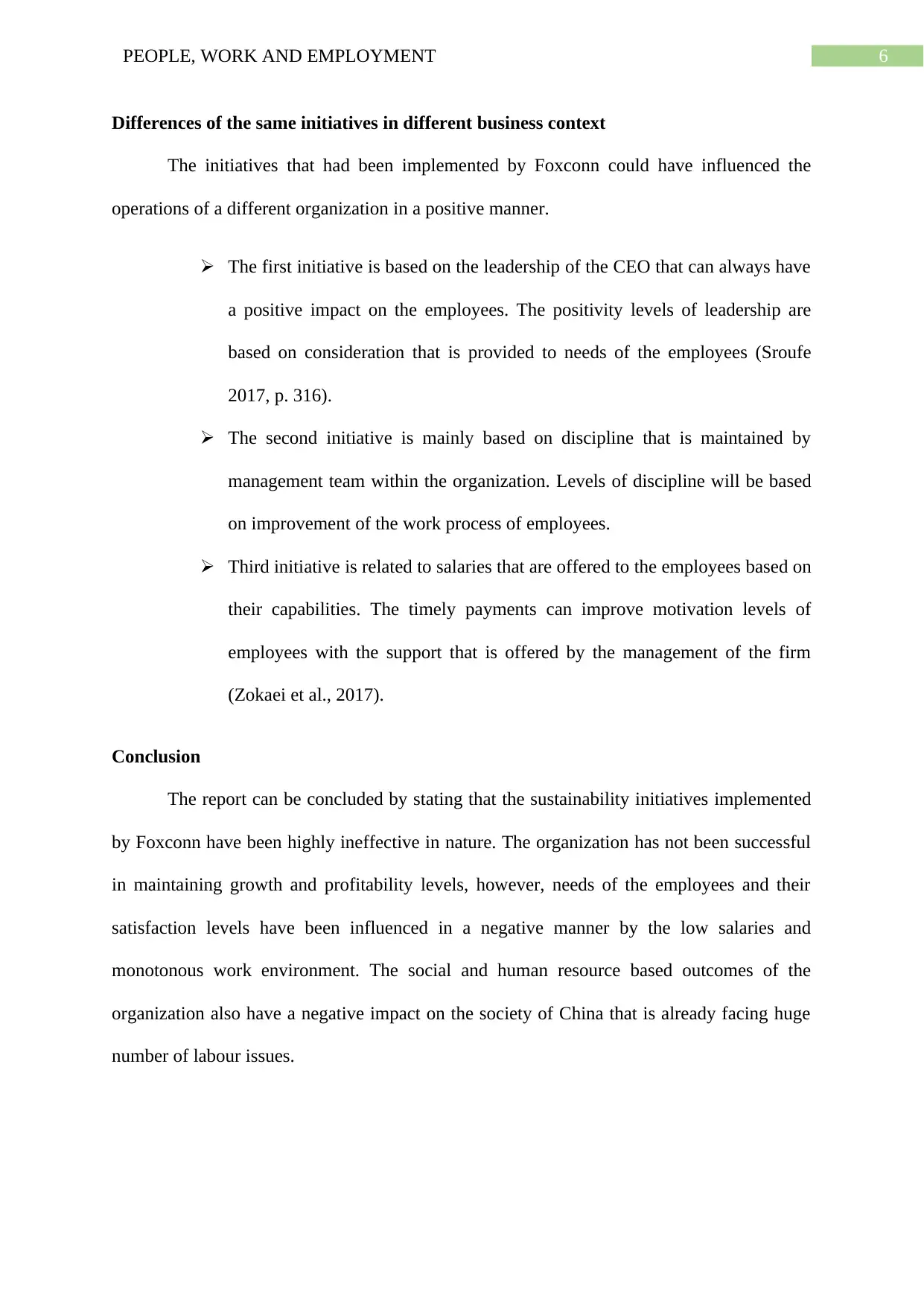
6PEOPLE, WORK AND EMPLOYMENT
Differences of the same initiatives in different business context
The initiatives that had been implemented by Foxconn could have influenced the
operations of a different organization in a positive manner.
The first initiative is based on the leadership of the CEO that can always have
a positive impact on the employees. The positivity levels of leadership are
based on consideration that is provided to needs of the employees (Sroufe
2017, p. 316).
The second initiative is mainly based on discipline that is maintained by
management team within the organization. Levels of discipline will be based
on improvement of the work process of employees.
Third initiative is related to salaries that are offered to the employees based on
their capabilities. The timely payments can improve motivation levels of
employees with the support that is offered by the management of the firm
(Zokaei et al., 2017).
Conclusion
The report can be concluded by stating that the sustainability initiatives implemented
by Foxconn have been highly ineffective in nature. The organization has not been successful
in maintaining growth and profitability levels, however, needs of the employees and their
satisfaction levels have been influenced in a negative manner by the low salaries and
monotonous work environment. The social and human resource based outcomes of the
organization also have a negative impact on the society of China that is already facing huge
number of labour issues.
Differences of the same initiatives in different business context
The initiatives that had been implemented by Foxconn could have influenced the
operations of a different organization in a positive manner.
The first initiative is based on the leadership of the CEO that can always have
a positive impact on the employees. The positivity levels of leadership are
based on consideration that is provided to needs of the employees (Sroufe
2017, p. 316).
The second initiative is mainly based on discipline that is maintained by
management team within the organization. Levels of discipline will be based
on improvement of the work process of employees.
Third initiative is related to salaries that are offered to the employees based on
their capabilities. The timely payments can improve motivation levels of
employees with the support that is offered by the management of the firm
(Zokaei et al., 2017).
Conclusion
The report can be concluded by stating that the sustainability initiatives implemented
by Foxconn have been highly ineffective in nature. The organization has not been successful
in maintaining growth and profitability levels, however, needs of the employees and their
satisfaction levels have been influenced in a negative manner by the low salaries and
monotonous work environment. The social and human resource based outcomes of the
organization also have a negative impact on the society of China that is already facing huge
number of labour issues.
Paraphrase This Document
Need a fresh take? Get an instant paraphrase of this document with our AI Paraphraser
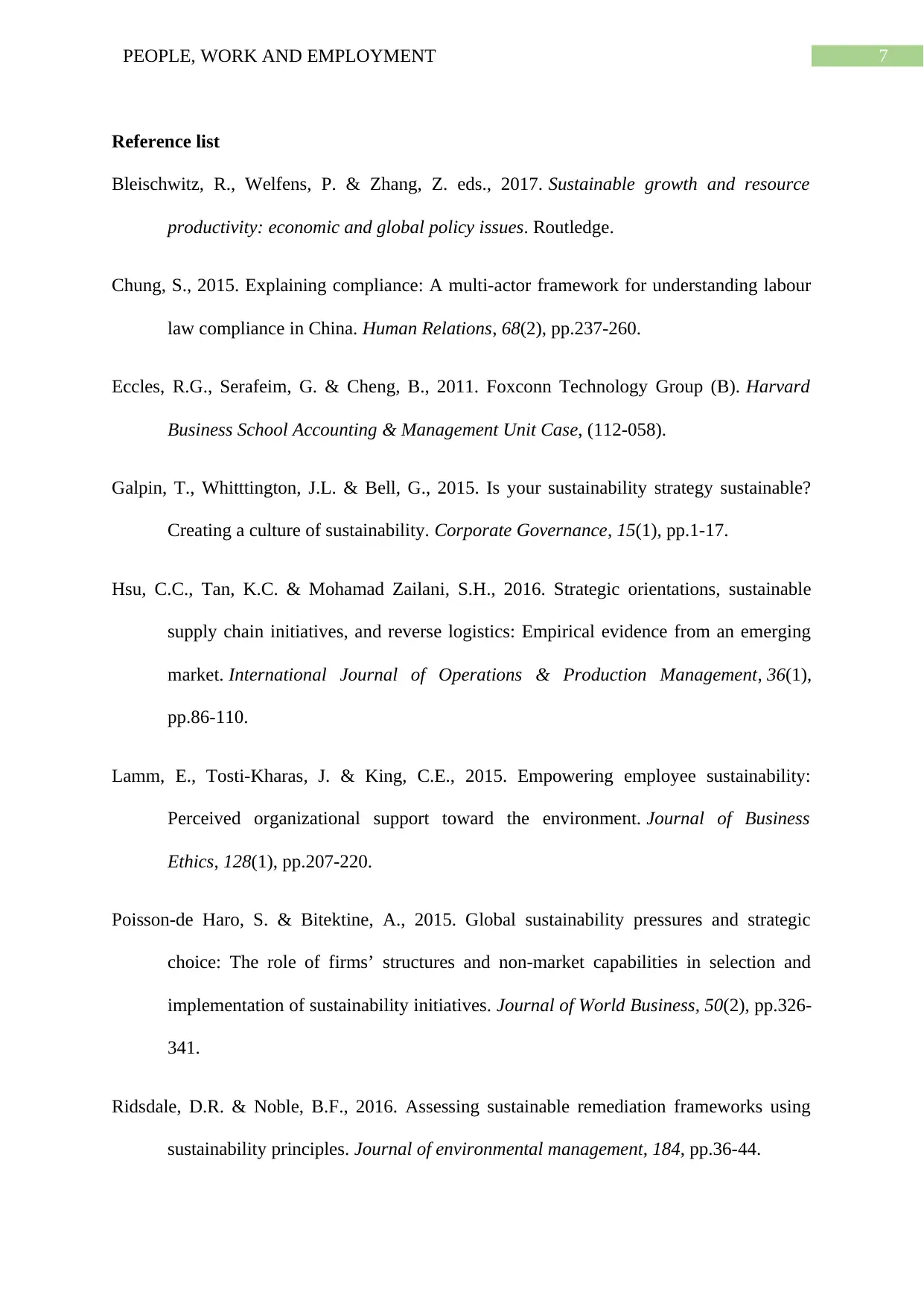
7PEOPLE, WORK AND EMPLOYMENT
Reference list
Bleischwitz, R., Welfens, P. & Zhang, Z. eds., 2017. Sustainable growth and resource
productivity: economic and global policy issues. Routledge.
Chung, S., 2015. Explaining compliance: A multi-actor framework for understanding labour
law compliance in China. Human Relations, 68(2), pp.237-260.
Eccles, R.G., Serafeim, G. & Cheng, B., 2011. Foxconn Technology Group (B). Harvard
Business School Accounting & Management Unit Case, (112-058).
Galpin, T., Whitttington, J.L. & Bell, G., 2015. Is your sustainability strategy sustainable?
Creating a culture of sustainability. Corporate Governance, 15(1), pp.1-17.
Hsu, C.C., Tan, K.C. & Mohamad Zailani, S.H., 2016. Strategic orientations, sustainable
supply chain initiatives, and reverse logistics: Empirical evidence from an emerging
market. International Journal of Operations & Production Management, 36(1),
pp.86-110.
Lamm, E., Tosti-Kharas, J. & King, C.E., 2015. Empowering employee sustainability:
Perceived organizational support toward the environment. Journal of Business
Ethics, 128(1), pp.207-220.
Poisson-de Haro, S. & Bitektine, A., 2015. Global sustainability pressures and strategic
choice: The role of firms’ structures and non-market capabilities in selection and
implementation of sustainability initiatives. Journal of World Business, 50(2), pp.326-
341.
Ridsdale, D.R. & Noble, B.F., 2016. Assessing sustainable remediation frameworks using
sustainability principles. Journal of environmental management, 184, pp.36-44.
Reference list
Bleischwitz, R., Welfens, P. & Zhang, Z. eds., 2017. Sustainable growth and resource
productivity: economic and global policy issues. Routledge.
Chung, S., 2015. Explaining compliance: A multi-actor framework for understanding labour
law compliance in China. Human Relations, 68(2), pp.237-260.
Eccles, R.G., Serafeim, G. & Cheng, B., 2011. Foxconn Technology Group (B). Harvard
Business School Accounting & Management Unit Case, (112-058).
Galpin, T., Whitttington, J.L. & Bell, G., 2015. Is your sustainability strategy sustainable?
Creating a culture of sustainability. Corporate Governance, 15(1), pp.1-17.
Hsu, C.C., Tan, K.C. & Mohamad Zailani, S.H., 2016. Strategic orientations, sustainable
supply chain initiatives, and reverse logistics: Empirical evidence from an emerging
market. International Journal of Operations & Production Management, 36(1),
pp.86-110.
Lamm, E., Tosti-Kharas, J. & King, C.E., 2015. Empowering employee sustainability:
Perceived organizational support toward the environment. Journal of Business
Ethics, 128(1), pp.207-220.
Poisson-de Haro, S. & Bitektine, A., 2015. Global sustainability pressures and strategic
choice: The role of firms’ structures and non-market capabilities in selection and
implementation of sustainability initiatives. Journal of World Business, 50(2), pp.326-
341.
Ridsdale, D.R. & Noble, B.F., 2016. Assessing sustainable remediation frameworks using
sustainability principles. Journal of environmental management, 184, pp.36-44.
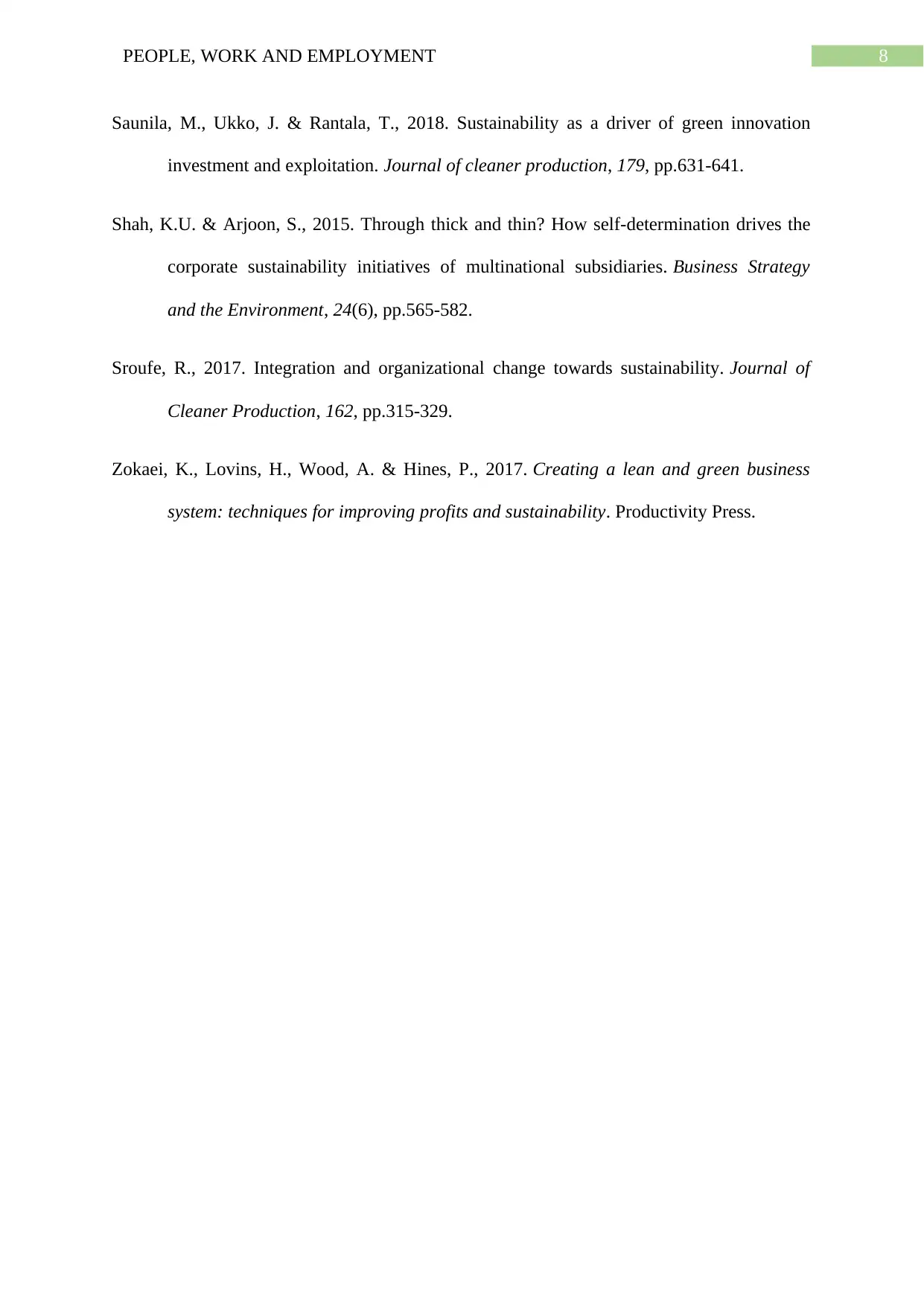
8PEOPLE, WORK AND EMPLOYMENT
Saunila, M., Ukko, J. & Rantala, T., 2018. Sustainability as a driver of green innovation
investment and exploitation. Journal of cleaner production, 179, pp.631-641.
Shah, K.U. & Arjoon, S., 2015. Through thick and thin? How self‐determination drives the
corporate sustainability initiatives of multinational subsidiaries. Business Strategy
and the Environment, 24(6), pp.565-582.
Sroufe, R., 2017. Integration and organizational change towards sustainability. Journal of
Cleaner Production, 162, pp.315-329.
Zokaei, K., Lovins, H., Wood, A. & Hines, P., 2017. Creating a lean and green business
system: techniques for improving profits and sustainability. Productivity Press.
Saunila, M., Ukko, J. & Rantala, T., 2018. Sustainability as a driver of green innovation
investment and exploitation. Journal of cleaner production, 179, pp.631-641.
Shah, K.U. & Arjoon, S., 2015. Through thick and thin? How self‐determination drives the
corporate sustainability initiatives of multinational subsidiaries. Business Strategy
and the Environment, 24(6), pp.565-582.
Sroufe, R., 2017. Integration and organizational change towards sustainability. Journal of
Cleaner Production, 162, pp.315-329.
Zokaei, K., Lovins, H., Wood, A. & Hines, P., 2017. Creating a lean and green business
system: techniques for improving profits and sustainability. Productivity Press.
1 out of 9
Your All-in-One AI-Powered Toolkit for Academic Success.
+13062052269
info@desklib.com
Available 24*7 on WhatsApp / Email
![[object Object]](/_next/static/media/star-bottom.7253800d.svg)
Unlock your academic potential
© 2024 | Zucol Services PVT LTD | All rights reserved.
